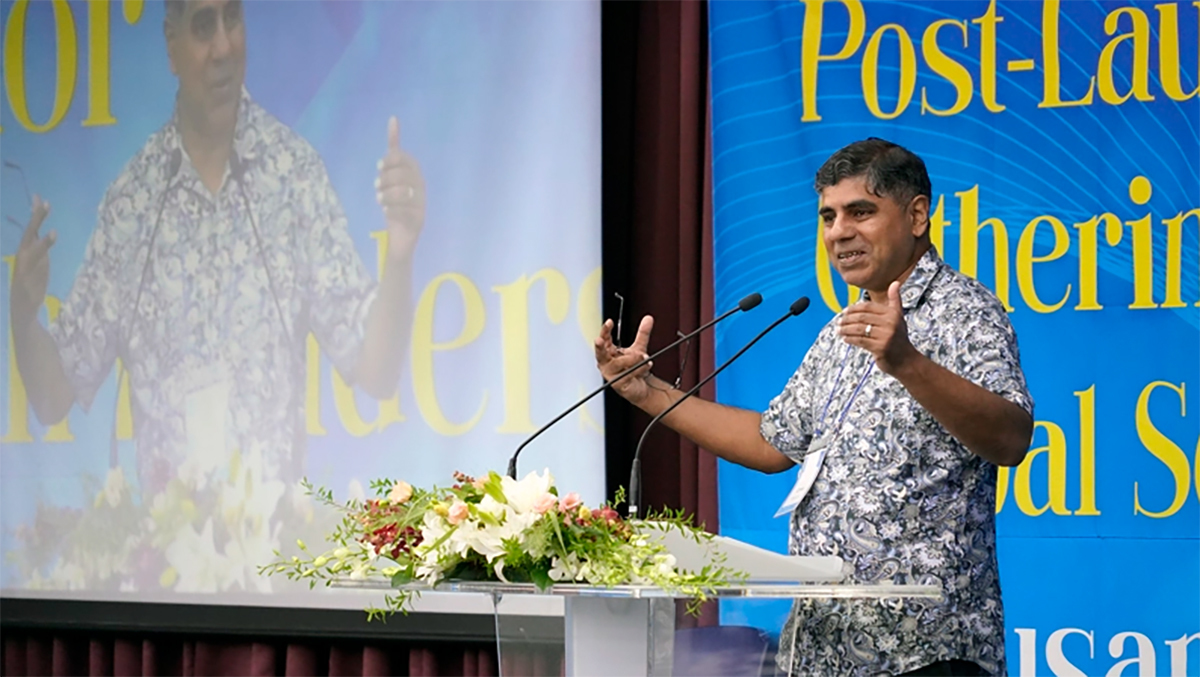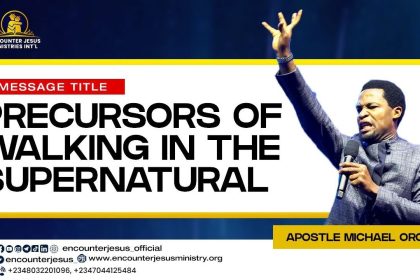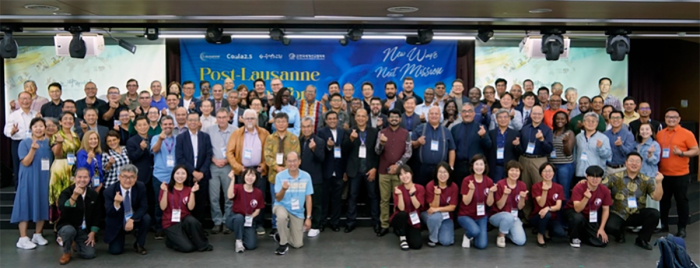
BUSAN, South Korea — Following the Fourth Lausanne Congress on World Evangelization in Incheon, 100 mission leaders from Africa, Asia, the Middle East and Latin America gathered for COALA 2.5, an emerging movement focusing on Global South-led missions held from Sept. 30-Oct. 1.
Recognizing the shift away from the primarily Western-led “Christendom” era of missions, COALA, which stands for Christ over Asia, Africa and Latin America, seeks to introduce new paradigms for today’s “polycentric” missions era: from everywhere to everywhere.
The meeting featured speakers who shed light on different contexts, historical developments and emerging trends that reveal how missions have moved away from the traditional models as the number of missionaries from the Global South increased in recent years. It also provided an opportunity for a larger group of mission leaders to review and provide feedback to the recommendations that had been drafted at COALA 2 in Bangkok, Thailand, last May, which Christian Daily International previously reported.
Inviting more leaders, creating greater ownership
COALA first emerged from the World Evangelical Alliance’s Mission Commission consultation in Chiang Mai, Thailand, in February 2023 where a presentation on the shift of global Christianity from Europe and the United States in the early 1900s to the Global South over the following century sparked conversations among a group of mission leaders from Asia and Latin America. In a follow-up meeting in Korea a few months later, the Global South leaders came together to talk about a new paradigm in missions, without participation of mission leaders from the Global North at first.
Seeking to continue these conversations, COALA 2 was held in Bangkok from May 1-3, with an emphasis on the importance of unity and authentic partnership in missions. They drafted a set of recommendations with the hope that they would start off conversations in the global Church that would lead to a cooperation in missions that is more suitable for the new era and recognizes the new realities today.
The post-Lausanne meeting in Korea, dubbed COALA 2.5, was not originally planned, according to the Rev. Jonas Kang, general secretary of the Korea World Missions Association (KWMA) who has spear-headed the new initiative alongside leaders of COMIBAM, a movement that brings together national mission groups or networks in 25 Latin American countries, as well as Spain, Portugal and Hispanics from the United States and Canada.
But Lausanne 4 already brought together many mission leaders from the Global South that it posed an opportunity to convene a group for an add-on event, he said. Thus, at the request from other leaders of the COALA steering group and with generous support by KWMA Board of Directors Chair and Senior Pastor of the mission-minded Sooyoungro Church, the Rev. Gyu Hyun Lee, the meeting was organized in Busan.
Kang told Christian Daily International that the primary purpose was to respond to questions by mission leaders who were curious to know more about this new movement. Ultimately, it will be the leaders at grassroots that would be the ones to implement the recommendations laid out by COALA at the meeting in Bangkok, he said.
Therefore, the Busan meeting provided an opportunity to hear from a wider range of mission leaders and thinkers from the Global South who could speak on polycentric missions and what it means in different regions and countries. The participants would also be invited to provide feedback to the Bangkok recommendations, so that the document could be refined and gain greater ownership among those who are working in the field.
From the Christendom era to a polycentric era in missions
At the center of the new initiative is the shift from the Christendom era missions paradigm to a new polycentric missions paradigm that has emerged in recent years. In his presentation, Kang summarized the Christendom missions approach as flowing from a “Christian” area to a “non-Christian” area.
Centered around missionaries that are sent by mission agencies with prayer and financial support, the goal is for these “outsiders” to plant churches and gain converts among the local people. The type of missionary that marked this era 50 to 100 years ago was a Western tall man with white skin and brown or golden hair, Kang commented.
He and others in the COALA movement emphasize that this approach was a valid mission method used by God during a specific period of time, and there is great appreciation for those who have dedicated their lives — sometimes even laid down their lives — to spread the Gospel in countries far away from their own. Looking at the reality today, however, they argue that this no longer reflects the way God is working in missions, and there is an urgent need to adjust the missions paradigm accordingly.
Part of Kang’s presentation included statistics that reveal the significant shift in Christianity from the Global North to the Global South over the past century. While more than 80% of Christians lived in Europe and the United States in 1900, the decline in the Western Church and the simultaneous explosive growth in the non-Western Church means that nowadays, two-thirds of Christians live in the Global South, while only one third lives in the Global North.
This change is also increasingly reflected in the global missionary force. Close to 90% of all missionaries worldwide were sent from the Global North in 1970 (227,000 versus 31,000). Just over 50 years later in 2021, the number of missionaries from the Global North remained steady at 227,000, but the number from the Global South grew exponentially to 203,000, resulting in an almost equal ratio of 53% Global North versus 47% Global South, according to Kang. This trend is expected to continue, meaning that soon a majority of missionaries will be sent from the Global South.
While Kang acknowledged that his own country of Korea has been “very good at copying mission methods from the United States” and has thus imitated the Christendom model for many years, there is an increasing realization that this model has serious limitations. A major change that needs to occur is for the focus to be centered on the locals (insiders) rather than the missionaries (outsiders), he commented.
“New standards are needed in areas such as money, missions, partnerships, leadership and service, entry and exit strategies, insider-led church planting, missionary attitudes (matching words and actions), and missions and partnerships in distressed areas,” Kang said.
A key theme that was repeated multiple times by different speakers is that the new missions paradigm cannot be based on budgets and financial resources because most countries in the Global South are less affluent. Instead, the emerging mission movements reveal ways that churches and mission agencies from regions like Latin America and Africa are finding ways to mobilize missionaries and organize outreach activities that do not depend on money.
Asia: ‘Christianity always had multiple centers’
In his presentation on ‘Setting sail for open seas — COALA and the rise of polycentric missions’, Manik Corea, national director for the Singapore Centre for Global Missions, recounted some of the developments that had led to the formation of COALA and shared what had emerged from conversations thus far.
Highlighting that he believes the idea of polycentric missions is not new, he said, “I do believe that the church and mission has always been polycentric. It’s just that we are discovering in our own time the wonder and the measure of that as it stretches across the nations of the world.”
“Christianity indeed has always had multiple centers; it has always been ‘poly’ centric. Whether it’s Jerusalem, Rome, Constantinople, London, Geneva, New York. But today, it is Seoul, Sao Paolo, Shanghai, Singapore, Cape Town, Nairobi, you name it. God is on the move,” Corea said.
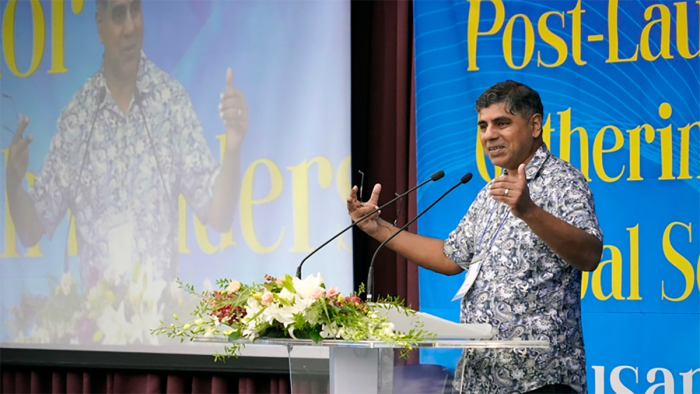
An important question that has emerged from earlier conversations, however, is what should be continued and what should be discontinued from the previous missions paradigm, he said.
As an example of what needed to be discontinued, he highlighted the historic issue of one region creating dependency within another region through superior finances, technology and other forms of power. This does not only refer to Western nations, he noted, as the same paradigm was inherited by some non-Western countries, including his own nation of Singapore.
Corea cautioned, however, that change shouldn’t be reactionary to what had been in the past. Rather, today’s mission leaders must adopt attitudes of humility and service, recognizing the need for each other as the Great Commission is too big for anyone to accomplish on their own.
In terms of continuity, he urged participants to always strive for unity in the Body of Christ, referring to the image the Apostle Paul in 1 Corinthians 12. He also highlighted the centrality of prayer in missions, and the importance of authenticity in all aspects of life.
Latin America: ‘God will provide along the way’
In an interview with Christian Daily International, Allen Matamoros, associate director of COMIBAM, echoed Corea’s comments that everyone was needed. He referred to a common joke among mission leaders that says, “We need the good thinking of the Europeans; we need the good planning of the Americans; we need the prayer spirit of the Koreans; and we need the joyful life of Africans and Latinos. We need everyone.”
He shared how Latinos have emerged as a significant mission force that bring cultural advantages in regions such as the Middle East or South Asia. Their own experience of coming from countries without political or financial power as well as their family-oriented and relational culture allows them to more easily build relationships with the locals who share many of the same traits.
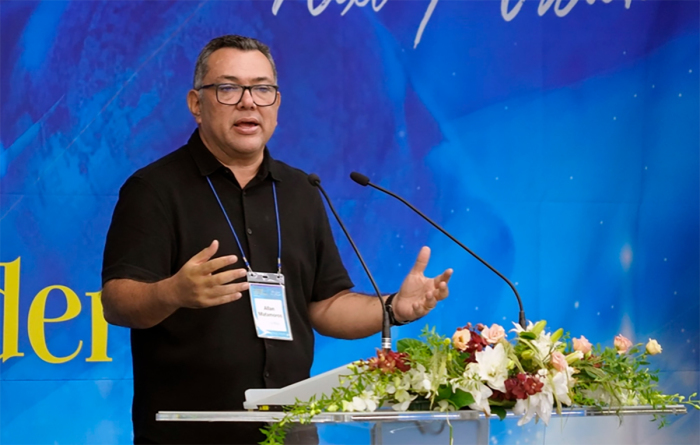
Latinos also have a different attitude to financial resources, Matamoros pointed out. While he has seen how mission ideas were sometimes rejected by Western leaders simply because of a lack of budget, he says that Latino leaders tended to have the perspective that “if a project is from God, He will also provide the funding along the way.”
In COALA, he sees a safe space for Global South leaders to talk about some of the models they have employed, and he is looking forward to talking about joint projects soon. The first meetings were mainly about building trust and a common understanding, he says. But looking ahead to COALA 3 in Panama next year, he hopes that first collaborative initiatives could emerge from the conversations.
Asked when he thinks COALA would invite Global North leaders, he said that for sure the time will come, but not yet.
He spoke openly about the kind of power dynamics he has witnessed in many meetings where American or European leaders quickly dominated the conversation. Sometimes, it could simply be because of the English language where Global South leaders were hesitant because they struggled to express their ideas in a foreign language. At other times, the issue was the Western culture of speaking up rather than waiting to be asked to speak, which meant that those with different cultural habits ended up not being able to participate.
Matamoros also pointed to “a kind of inferiority complex” that Global South leaders must overcome. He said he has seen “very vocal, very entrepreneurial leaders” from the Global South “just disappearing from the conversation” as soon as three or four Americans appear. He emphasizes that “it’s not the fault of the Americans,” but “we are learning to understand who we are and to take our role. It is something that the two sides should be resolving.”
He is encouraged that there has been visible progress already as more global organizations invite Africans, Latinos and Asians to their boards. But he believes there is also a need to build a new set of policies for missions. COALA offers the space to discuss these issues and come up with recommendations, such as the ones that came out of the Bangkok meeting, he said.
And like others in COALA, Matamoros hopes that they will help create new paradigms for authentic partnerships in missions, which will benefit everyone. “We are living in a transition, trusting the Lord that it’s going to be for good for the North and for the South, for the East and for the West,” he said.
Africa: ‘What kind of Christianity will we be taking to the rest of the world?’
COALA 2.5 marked the first gathering that featured mission leaders from Africa. Kenyan Steven Mbogo from African Enterprise spoke about the history of mission in Africa, which he emphasized predates the 19th century missionary era and goes back to the encounter of Philip with the Ethiopian eunuch in the book of Acts.
To illustrate the importance of including Africa in global conversations, he highlighted some of the unique characteristics of the continent, including its sheer size, which is larger than China, the U.S., India and several other countries combined, and the median age of only 19 years, which makes it the youngest region in the world.
He also noted that today, Africa is the region with the highest number of Christians in the world, and that without the continued growth of the African Church, the growth rate of global Christianity would trail behind the overall global population growth, meaning that the number of Christians would be declining relative to those of other or no faiths.
The changes that have occurred over the past century have been significant, Mbogo said.
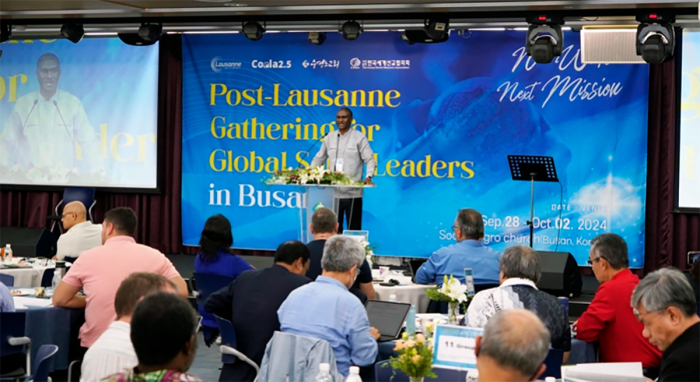
An example is the fact that at the Edinburgh, Scotland, missions conference in 1910, Africa was represented by Western missionaries. One hundred years later, however, the Third Lausanne Congress on World Evangelization was held in Cape Town, South Africa, in 2010, allowing Africa to host the largest global missions conference at the time.
While the growth of the Church alongside an increasing missionary force that is active within the continent as well as beyond Africa are reasons to celebrate, Mbogo cautioned that discipleship and leadership training are critical needs.
“If by 2050, half of the world’s Evangelicals are in Africa, what kind of Christianity will we be taking to the rest of the world?” he asked.
“The African Church needs to galvanize all its resources, including its youth, its diaspora, its population and natural resources,” he said. He emphasized the importance of establishing interdenominational mission associations across Africa — only a handful have been established in recent years — in order to foster collaboration among all those involved in missions and provide reliable research and data.
“The African Church also needs to guard against secularism while ensuring its members are discipled holistically, so as to make a difference at home and be relevant to the nations of the Earth,” he said. “May the African Church and the Global South Church be a light that shines far while also shining bright at home.”
A better term for polycentric missions?
As COALA continues to work on defining the new era and recommending mission models and practices that align with what God is doing today, Executive Director of the World Evangelical Alliance’s Mission Commission, Jay Mātenga, offered some additional historical and language perspectives to consider.
During his presentation, he first highlighted several mission movements and initiatives over the past several decades that show how leaders from the Global South have taken on increasingly visible roles in global missions already since the 1970s. Therefore, COALA participants are “the latest in an honorable history of Majority World missions leaders seeking to promote fresh participation in God’s purposes throughout the world.”
Secondly, he expressed hesitations around the word ‘polycentric,’ which he believes is a technical and political term that doesn’t accurately reflect the paradigm and authentic partnerships COALA and other emerging missions movements strive for.
“From my perspective, I believe that ‘mutuality’ better expresses a ‘from everywhere to everywhere’ missiology. It is about koinonia, sharing, reciprocity, co-laboring, synergism, equitability,” he said.
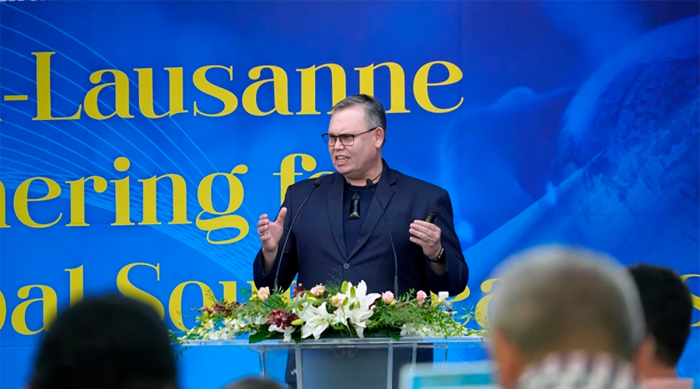
Mātenga, who also serves as the opinion editor for Christian Daily International, believes that polycentrism can be a helpful concept to emphasize the importance of the local, “the indigenization of the Gospel within a specific context.”
“I have come to recognize that wherever the Gospel is planted, there we need to acknowledge local authority for protecting, nurturing, and ultimately propagating it,” he said, adding that mature local Christian leaders needed to be respected as guardians of the Gospel for their people.
“I am talking about local self-determination: self-governing, self-supporting, self-propagating, and self-theologizing, but I would add self-giving, to describe when an indigenous church participates as part of the global church — a 5-self church, because no part of the Body of Christ exists in isolation and we’re all to contribute to spreading the Gospel,” he said. “This is mutuality in World Christianity.”
Referring to Isaiah 43:19, Mātenga said one of his colleagues highlighted that change makes people uncomfortable, so he paraphrased the passage quoting it as, “God is doing a new thing, but do we dare to perceive it?”
He challenged mission leaders, “Do we dare honor the local and hold back from imposing our cultural Christianity upon them? Do we dare say to the Western missions paradigm, ‘thank you for all you have done, but let us reset the drawing board, lay aside your assumptions, and find new ways forward from here, together, with high mutuality?’”
He also cautioned that regardless of one’s background, everyone needed to acknowledge their own ethnocentricities, biases and prejudices and repent of those, so that the same colonial mistakes would not be repeated “with a different skin tone.”
Finally, Mātenga again highlighted the key themes of the COALA2 recommendations for missions and called on participants to commit to following them: the primacy of the Holy Spirit; the importance of the local and multi-church connections; the need for missionary humility and service to the local church; contextual and cultural sensitivity; promoting growth in the depth and breadth of indigenized Christianity; and, careful use of outside resources for mutual benefit.
“It is our commitment to mutual relationships as the whole Church taking the whole Gospel into the whole world, living our faith out loud, that will change this world for Jesus,” he said.
Originally published at Christian Daily International
Christian Daily International provides biblical, factual and personal news, stories and perspectives from every region, focusing on religious freedom, holistic mission and other issues relevant for the global Church today.




